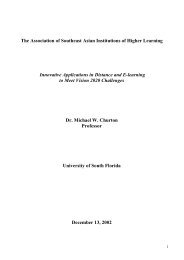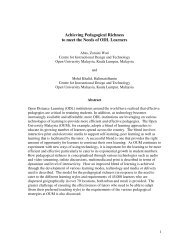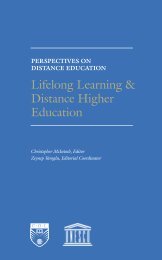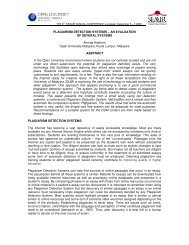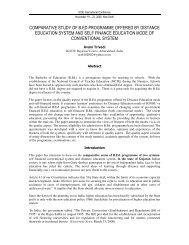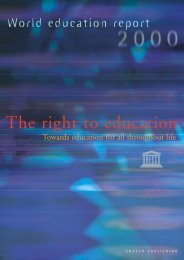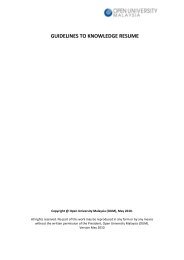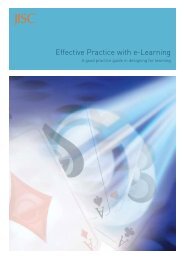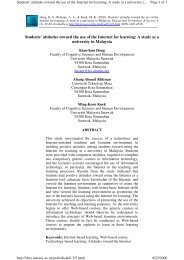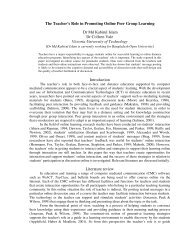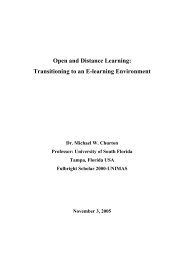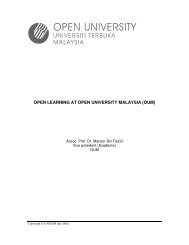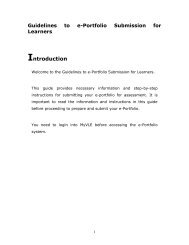e-learning readiness - Asia Pacific Region - Open University Malaysia
e-learning readiness - Asia Pacific Region - Open University Malaysia
e-learning readiness - Asia Pacific Region - Open University Malaysia
- No tags were found...
You also want an ePaper? Increase the reach of your titles
YUMPU automatically turns print PDFs into web optimized ePapers that Google loves.
<strong>University</strong> College, lecturers are encouraged to set up online forums forgroup discussions as part of the teaching-<strong>learning</strong> experience. Hence, E-<strong>learning</strong> is currently believed to be a potentially significant area ofdevelopment in <strong>Malaysia</strong>. This study on E-<strong>learning</strong> <strong>readiness</strong> is thereforetimely and will shed light on the current state of E-<strong>learning</strong>, E-<strong>readiness</strong>and E-<strong>learning</strong> <strong>readiness</strong> in <strong>Malaysia</strong>.1.2 Literature ReviewWith respect to E-<strong>learning</strong> <strong>readiness</strong> in the <strong>Malaysia</strong>n context, thefollowing reports represent some of the seminal works on E-<strong>learning</strong>, E-<strong>learning</strong> <strong>readiness</strong> and E-<strong>readiness</strong> in the <strong>Malaysia</strong>n context:1. Report of the National Information Technology Council (NITC)Working Group on Electronic Learning, May 1999 (UNIMAS,1999).2. E-ASEAN Readiness Assessment by ASEAN and IBM GlobalServices, October 2001.3. National ICT Approaches: Selected Case Studies (<strong>Malaysia</strong>) byAccenture, the Markle Foundation and UNDP. www.optinit.org/framework/pages/2.3.html4. Report on 2004 E-<strong>readiness</strong> Ranking- A white paper from theEconomist Intelligence Unit, written in cooperation with IBMCorporation.5. Report of the <strong>Asia</strong> Cooperation Dialogue on E-<strong>learning</strong> by <strong>Open</strong><strong>University</strong> <strong>Malaysia</strong> (2004).The above-mentioned reports have outlined several predictors of acountry’s E-<strong>learning</strong> <strong>readiness</strong>. Some of these are per capita income,telecommunication networks, urbanization, pro-competitive macropolicies and an emphasis on privatization. Research has also utilized acontinuum-based approach to calibrating E-<strong>learning</strong> <strong>readiness</strong> for thepurpose of cross-nation comparison and inter-oranizationalbenchmarking. For example, a report by ASEAN (ASEANSecretariat/IBM, 2001) has indicated that ELR may be determined along afour point scale containing descriptors such as emerging, evolving,embedding and extending to describe the extent of <strong>readiness</strong> or acountry’s level of E-<strong>learning</strong> programme implementation.A significant finding of the review of this literature is that there appears tobe affirmation of a high amount of e-<strong>readiness</strong> among <strong>Malaysia</strong>ns, a pointthat puts us in good standing internationally. In an E-ASEAN ReadinessAssessment Report (ASEAN Secretariat/ IBM, 2001) it was found that<strong>Malaysia</strong> ranked second on all assessment measures pertaining toinfrastructure, E-society, E-commerce and E-Government. In terms of E-<strong>readiness</strong> rankings among countries of the <strong>Asia</strong>-<strong>Pacific</strong> region, <strong>Malaysia</strong>Joint Study by MEWC and OUM 4



